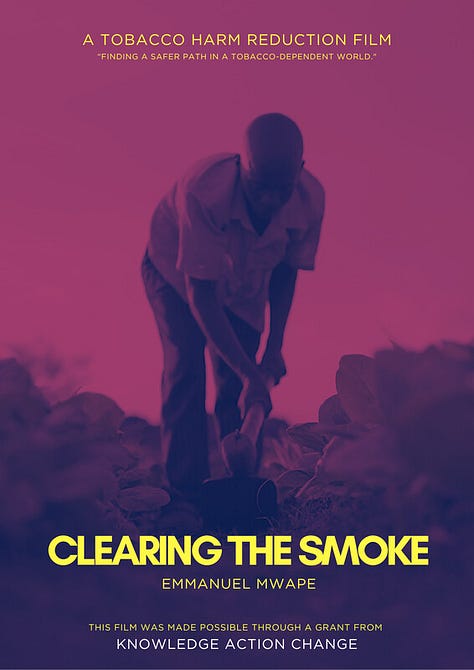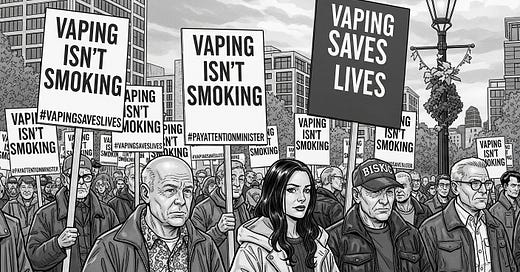Every May 30th, World Vape Day emerges as an act of health insubordination—an uncomfortable proposal for some, but an urgent one. In the face of policies that demand all or nothing, this global day affirms alternatives—those that save, support, and listen. Backed by science, art, and organized citizens, the harm reduction movement challenges institutional silence and defends an often-denied core principle: the right to choose how to care for oneself.
This year, World Vape Day marks twenty years of technological innovation and a decade of public awareness. Millions of people commemorate this day with a demand that echoes across languages and geographies: tobacco control strategies must open up to dialogue, scientific evidence, and new ways of supporting, not punishing, those who want to quit smoking.
Every May 30th, on the eve of World No Tobacco Day, proclaimed by the World Health Organization, an increasingly broad coalition—made up of activists, scientists, health professionals, consumers, and civil society organizations—comes together around a common cause: commemorating World Vape Day.
Born a decade ago as a grassroots initiative in Spain, this day has evolved into an international counterbalance to the institutional narrative, which often focuses exclusively on abstinence as the only possible path. In contrast to this singular vision, harm reduction advocates raise their voices from different corners of the world to assert—urgently and with conviction—that another strategy is possible: reducing harm is viable and necessary.
Far from being a marginal observance, World Vape Day has become a key platform for advocating a more pragmatic, informed, and evidence-based approach in the fight against smoking, an epidemic responsible for over eight million deaths each year. Within this global outcry, one idea is repeated with almost choral insistence: harm reduction is both a public health and ethical imperative.
A Date with Strategic Meaning
Precisely positioned on the eve of World No Tobacco Day—a day dedicated to global anti-smoking campaigns—World Vape Day emerges as symbolic and practical resistance. It’s not merely about opposing the dominant narrative, but about confronting it: challenging the top-down approach that, under the guise of health neutrality, denies access to effective tools for those who wish to quit smoking.
“It’s about the right to access tools that work,” says Francisco Ordóñez, harm reduction advocate in Bogotá and president of the Colombian Vapers Association. “We’re not promoting nicotine—we’re promoting options that don’t kill.”
An always-growing body of scientific evidence backs options like vaping devices. Ten years ago, Public Health England estimated that vaping is at least 95% less harmful than smoking conventional cigarettes. The science is precise: vaping is significantly less dangerous and offers a lifeline to millions: “My reading of the evidence is that smokers who switch to vaping remove almost all the risks smoking poses to their health," says Professor Peter Hajek, director of the Health and Lifestyle Research Unit at Queen Mary University of London. Similarly, New Zealand’s Ministry of Health has openly stated that “vaping is much less harmful than smoking” and that “it can help some people quit smoking.”
The Rise of Vaping: Global Figures
The number of people who have switched from smoking to vaping has surged over the past decade, marking a paradigm shift in nicotine consumption patterns. In 2011, there were only about seven million users; by 2018, the figure had risen to 41 million, and by 2020, it was estimated at 68 million vapers worldwide. According to a study by Tomasz Jerzyński and Gerry Stimson, published in Drugs, Habits and Social Policy, the number had reached 82 million active users by 2021.
Beyond its quantitative growth, the geographic distribution of this phenomenon highlights its truly global nature. Based on data collected four years ago, the regional spread is as follows:
Europe: 20.1 million users
Americas: 16.8 million
Western Pacific: 16 million
Southeast Asia: 14.3 million
Eastern Mediterranean: 9.2 million
Africa: 5.6 million
These figures illustrate not only the scale of the shift but also its cultural and economic breadth. Vaping is no longer a marginal or localized practice: it is now a widespread reality that raises urgent questions about regulation, public health, individual rights, and social justice.
A Festival to Tell What Others Won’t
This year, the commemoration of World Vape Day opens a new front: the cultural one. The THR Film Festival is born—an international showcase of short films and documentaries on Tobacco Harm Reduction.
Conceived by João Pedro Teixeira, a fellow of the Tobacco Harm Reduction Scholarship Program at Knowledge Action Change, an expert in audiovisual storytelling, and a key figure behind the renowned FANTASPOA, the Porto Alegre International Fantastic Film Festival, this event is envisioned as a platform to inform, move, and inspire through cinema.
The selection, available for free on YouTube until June 1st, features works that give voice to silenced realities, marginalized experiences, and narratives often excluded from official discourse.
Highlighted Titles:
906 Vapor – Dir. Marilena Marchetti (USA, 2024)
Clearing the Smoke – Dir. Emmanuel Mwape (Zambia, 2025)
Just as Good – Dir. Gape Ndlovu & Metlha Ngubevana (Botswana, 2025)
Vapor Madness – Dir. Emil Todorov (Bulgaria, 2024)
Saving Chalo – Dir. Emmanuel Mwape (2021, Zambia)
Tsanzo – Dir. Beatus Ble Msamange (Malawi, 2022)
Special In-Person Screening in Curitiba (Brazil)
On May 31, 2025, at 6:30 p.m., a live screening will take place with support from THR Brasil and Direta at Shinobis (Dr. Faivre Street, 507 – Downtown Curitiba).
This festival celebrates cinema as an art form and reclaims it as a tool for social transformation, capable of shedding light on what many prefer to keep in the shadows: the right to viable alternatives, individual autonomy, social justice, and the urgent need for more humane approaches in public health.



The Right to Choose How to Care for Oneself
World Vape Day is not just another entry on the public health calendar. It’s a date that unsettles, questions, and proposes. It proposes facing a public health crisis without repeating failed formulas. It proposes listening to those who have found in vaping a way out, not a sentence. Ultimately, it proposes a vision of public health that doesn’t impose from above but is built from experience, knowledge, and respect for autonomy.
In a world where scientific authority is constantly contested—sometimes denied, sometimes manipulated—harm reduction emerges as an ethical principle before a technical one: to listen, support, and understand contexts rather than punish them.
This is not about glorifying vaping. It’s about recognizing that millions have chosen to seek alternatives in the face of institutional silence. And many have found in that choice a second breath.
Film, data, voices, networks—all converge in a single demand: the right to choose how to care for oneself. A right that shouldn’t be revolutionary, yet still is in far too many countries.
A Day of Dialogue and Participation
Throughout May 30th, open and free virtual events will bring doctors, scientists, public health experts, digital influencers, and users for talks, roundtables, and debates. The goal goes beyond information-sharing—it’s a commitment to building truly democratic spaces for dialogue, something official strategies rarely encourage.
The commemoration also expands into the digital space. On social media, the campaign invites people to share messages of individual and collective empowerment using the official hashtags:
#20YearsSmokeFree / #20AñosSinHumo
#MyHealthMyChoice / #MiSaludMiElección
#HarmReductionNow / #ReducciónDeDañosYa
#WorldVapeDay / #DíaMundialDelVape
To encourage active participation, ARDT has made downloadable materials available (in Spanish) across various platforms:
Facebook: banners and testimonials
Instagram: stories, reels, and carousels
X (Twitter): quotes, facts, and visuals
All content is available on the official site:
www.ardtiberoamerica.org/dia-mundial-vapeo-2025







Beautifully written!
One minor update on the history of WVD. "The first World Vaping Day (WVD) was celebrated on March 22, 2012. It was organized by the Consumer Advocates for Smoke-free Alternatives Association (CASAA) in the United States. People in 15 countries participated in what became an annual event." Source: https://filtermag.org/world-vape-day/